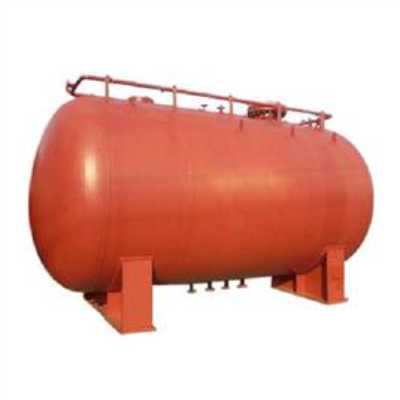Get In Touch
Get In Touch




A Mild Steel (MS) Storage Tank is a robust and durable container designed to safely store various liquids, chemicals, or gases. Constructed from mild steel, it exhibits excellent corrosion resistance and structural integrity. These tanks come in various shapes and sizes, including cylindrical, rectangular, or conical, to suit different storage requirements. MS storage tanks are commonly used in industries such as manufacturing, agriculture, and petrochemicals for the containment of substances like water, oil, fuels, and hazardous chemicals. They are equipped with accessories like vents, gauges, and safety features to ensure safe storage and easy maintenance, making them an essential component of industrial infrastructure.
1. Material: Mild Steel (MS) for tank construction, typically conforming to relevant ASTM or IS standards.
2. Capacity: Specify the storage capacity in liters, gallons, or any appropriate unit, depending on the intended use.
3. Design and Shape: Outline the tank's design, which may be cylindrical, rectangular, conical, or customized to meet specific requirements.
4. Thickness: Specify the thickness of the mild steel plates used for tank walls and the base, which should meet structural and corrosion resistance standards.
5. Coating: Specify the type of protective coating, if any, applied to the interior and exterior to prevent corrosion, such as epoxy, rubber lining, or paint.
6. Reinforcement: If required, describe the structural reinforcements used to strengthen the tank against internal or external pressures.
7. Accessories: List and describe all accessories, including inlet/outlet ports, manholes, inspection hatches, pressure/vacuum relief valves, gauges, and level indicators.
8. Foundation: Detail the foundation requirements, considering the tank's weight, dimensions, and load-bearing capacity.
9. Sealing: Specify the sealing method for joints and connections, ensuring a secure and leak-proof structure.
10. Agitators and Mixers: If applicable, describe the agitators or mixers installed for substances that require agitation within the tank.
11. Safety Features: Include safety features like overfill protection, emergency venting, and grounding systems to prevent accidents.
12. Ventilation: Specify the ventilation system to maintain the air quality inside the tank and prevent the accumulation of hazardous fumes.
13. Pressure and Temperature Ratings: State the maximum allowable working pressure and temperature for safe storage.
14. Welding Standards: Ensure that welding procedures and standards conform to industry-specific codes and regulations.
15. Testing and Inspection: Specify the testing procedures (e.g., hydrostatic testing) and inspection requirements to ensure the tank's structural integrity.
16. Cathodic Protection: If required, include details of a cathodic protection system to prevent corrosion of the tank's interior.
17. Legislation Compliance: Ensure compliance with relevant safety, environmental, and industrial regulations and standards.
18. Documentation: Provide comprehensive documentation, including fabrication drawings, material certificates, and operation and maintenance manuals.
19. Transportation and Installation: Address transportation and installation logistics, especially for large or customized tanks.
20. Customization: Mention any additional custom features or requirements based on the specific use of the tank, such as heating elements or specialized linings.
1. Industrial Chemical Storage: MS tanks are used to store a wide range of industrial chemicals, including acids, bases, solvents, and corrosive substances.
2. Petroleum and Fuel Storage: Commonly employed for the storage of petroleum products, such as gasoline, diesel, and lubricants, in industries like oil and gas, transportation, and construction.
3. Water Storage: MS tanks are used for potable water storage in residential, commercial, and industrial settings, as well as for wastewater treatment.
4. Agriculture: MS tanks are utilized for the storage of fertilizers, pesticides, herbicides, and water on farms and agricultural facilities.
5. Food and Beverage Industry: Used to store food-grade liquids such as cooking oils, syrups, and food processing ingredients, adhering to food safety regulations.
6. Pharmaceuticals: MS tanks are employed for the storage of pharmaceutical raw materials, chemicals, and pharmaceutical-grade water.
7. Pulp and Paper Industry: Used for the storage of chemicals, pulps, and papermaking additives in paper and pulp manufacturing facilities.
8. Textile Industry: MS tanks are used to store chemicals and dyes for textile dyeing and finishing processes.
9. Water Treatment: Applied in water treatment plants to store chemicals, such as chlorine and alum, used for purification and coagulation.
10. Construction: MS tanks store concrete admixtures, mortar, and construction materials like cement and aggregates at construction sites.
11. Mining Industry: Employed to store chemicals, water, and slurry used in mineral processing and mining operations.
12. Environmental Applications: Used for the storage of hazardous waste materials and chemicals in environmental remediation and waste management.
13. Power Generation: MS tanks store chemicals, including lubricating oils and cooling water, for power plants and electricity generation.
14. Petrochemical Industry: Used for the storage of various petrochemical products and raw materials in petrochemical manufacturing facilities.
15. Brewing and Distilling: MS tanks store raw materials, additives, and final products such as beer, spirits, and wines.
16. Transportation: MS tanks are found in transportation vehicles, like trucks and ships, to store fuels and chemicals for transportation purposes.


